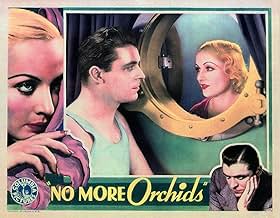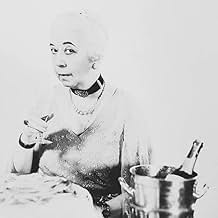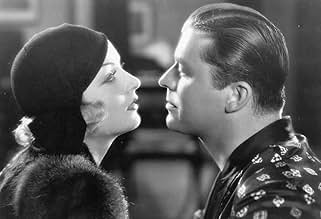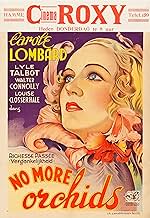An heiress forced to marry into royalty in order to save her banker father falls in love with another man while on a cruise.An heiress forced to marry into royalty in order to save her banker father falls in love with another man while on a cruise.An heiress forced to marry into royalty in order to save her banker father falls in love with another man while on a cruise.
- Director
- Writers
- Stars
Sidney Bracey
- Holmes
- (uncredited)
Belle Johnstone
- Housekeeper
- (uncredited)
Edward LeSaint
- Capt. Jeffries
- (uncredited)
Wilfred Lucas
- Banker
- (uncredited)
Charles Hill Mailes
- Merriwell
- (uncredited)
Harold Minjir
- Modiste
- (uncredited)
Broderick O'Farrell
- Benton -- Butler
- (uncredited)
William Worthington
- Cannon
- (uncredited)
- Director
- Writers
- All cast & crew
- Production, box office & more at IMDbPro
Featured reviews
"Annie" (Carole Lombard) is the spoilt gal used to delaying ocean liners and swapping her baubles at dinner. It's on that very boat, that she encounters "Tony" (Lyle Talbot) who proves completely impervious to her charms and that just makes her even more determined to get her man. Meantime, she gets home to her family where, unbeknownst to her, her banker father (Walter Connolly) is in a bit of a bind. The family wealth comes from her grandfather (Sir C. Aubrey Smith) and he will only help out if she agrees to marry an European prince. She loves her man, she loves her father, her grandad only loves himself and his dynastic plans. What will she do? I like Lombard. She always managed to exude a strength of character, usually disguised amidst some ditziness and flamboyance and here's there quite a bit of defiance too. Talbot does fine as her onboard foil, Connolly likewise as her out-of-his-depth dad and there are also a punchy series of contributions from Louise Closser Hale as the cocktail-loving grandmother. The ending is really quite fitting, but not in the way you might expect and with some really quite lively writing throughout, it's a good watch.
A wonderful cast of supporting character actors enlivens a soap opera about how Carole Lombard falls in love with reverse-snob Lyle Talbot and thwarts the plans of her grandfather -- played by the wonderful C. Aubrey Smith -- to marry his family into European royalty. In the meantime her father -- played by Walter Connolly -- is about to see his bank fail.
It seems apparent that the novel on which this book is based is a lot more complex than this movie. The dialogue is competent, but not great, and people tend to play types rather than individuals. But while this is not a great movie, the wonderful players make it far more enjoyable than anyone would expect it to be. Even Lyle Talbot, usually confined to a simple juvenile lead at his home base of Warner Brothers in this period, is excellent, if a tad declamatory.
It seems apparent that the novel on which this book is based is a lot more complex than this movie. The dialogue is competent, but not great, and people tend to play types rather than individuals. But while this is not a great movie, the wonderful players make it far more enjoyable than anyone would expect it to be. Even Lyle Talbot, usually confined to a simple juvenile lead at his home base of Warner Brothers in this period, is excellent, if a tad declamatory.
Rather schizophrenic comedy-drama from post-Prohibition but pre-Hays Code, meaning Carole Lombard gets to strut around in her flimsies, make prurient wisecracks, and be not the least timid about getting what she wants. She's a rich girl with a bumbling banker dad (Walter Connolly, playing virtually the same role as a year later in "It Happened One Night") and an aren't-I-adorable grandma (Louise Closser Hale, trying to be May Robson) who falls for unrich Lyle Talbot (a perfectly OK leading man, who looks a bit like the pre-mustachioed Gable, and has some of the Gable swagger). Why her awful grandpa would insist on her marrying somebody else isn't clear, nor is it clear why the sacrifice at the end makes everything all right. But ignore the plot and enjoy the ribald ripostes, and, especially, Carole looking gorgeous and wriggling around with great vivacity. She has star quality, but beyond that, she's a real actress, and you'll notice how carefully she's building and sustaining a not-always-likable character. Fine work.
NO MORE ORCHIDS is just a little programmer movie but it's an incredibly elegant one. Columbia studios in the early 1930's was thought of as something as a poverty row studio yet this film looks as slick and expensive as any potboiler the more uptown MGM or Paramount might have produced.
Carole Lombard stars as a spoiled society girl who is engaged to a prince in a marriage arranged by her controlling grandfather C. Aubrey Smith. On the ocean-liner back to America, she falls in love with white collar worker Lyle Talbot (who in her pampered world qualifies as "penniless") and eventually breaks his cool barrier. Lombard's pal of a dad, Walter Connally, and paternal grandmother Louise Closser Hale are crazy about Talbot but mean old grandpa Smith is not about to let his plans fall through, having seen his own late daughter marry "beneath" her.
Carole Lombard is superb as the frivolous but good-hearted socialite and she surprisingly is matched by Lyle Talbot, one of the era's reliable but usually bland leading men; in this picture, Talbot exhibits a sex appeal seldom tapped in the scores of bread-and-butter pictures he cranked out. Connally is very good in one of his first movie roles as father to a screwball romantic comedy queen (although this picture ventures more toward soap opera "women's picture" despite some nice comedy bits). Talented character player Louise Closser Hale seems a bit miscast, she's a bit too cutesy and lacks the saltiness a May Robson might have brought to the part. Smith essays a rare villainous part in a rather brief but pivotal role. Ruthelma Stevens and the very cute Allen Stevens have the only other somewhat featured parts as two of Lombard's good-time buddies in the society crowd; these small parts are among the larger ones for each of them, as they generally played bits.
Lombard is so strikingly beautiful and assured in her performance here it's hard to believe she was little more than a starlet at the time and not yet a major Hollywood star. She is sensationally photographed, although one scene makes her facial scar from an early car wreck more visible than I've ever seen it in one of her films. NO MORE ORCHIDS is just another Hollywood movie but it moves quickly and smoothly and is well worth your time if you love films from the 1930's.
Carole Lombard stars as a spoiled society girl who is engaged to a prince in a marriage arranged by her controlling grandfather C. Aubrey Smith. On the ocean-liner back to America, she falls in love with white collar worker Lyle Talbot (who in her pampered world qualifies as "penniless") and eventually breaks his cool barrier. Lombard's pal of a dad, Walter Connally, and paternal grandmother Louise Closser Hale are crazy about Talbot but mean old grandpa Smith is not about to let his plans fall through, having seen his own late daughter marry "beneath" her.
Carole Lombard is superb as the frivolous but good-hearted socialite and she surprisingly is matched by Lyle Talbot, one of the era's reliable but usually bland leading men; in this picture, Talbot exhibits a sex appeal seldom tapped in the scores of bread-and-butter pictures he cranked out. Connally is very good in one of his first movie roles as father to a screwball romantic comedy queen (although this picture ventures more toward soap opera "women's picture" despite some nice comedy bits). Talented character player Louise Closser Hale seems a bit miscast, she's a bit too cutesy and lacks the saltiness a May Robson might have brought to the part. Smith essays a rare villainous part in a rather brief but pivotal role. Ruthelma Stevens and the very cute Allen Stevens have the only other somewhat featured parts as two of Lombard's good-time buddies in the society crowd; these small parts are among the larger ones for each of them, as they generally played bits.
Lombard is so strikingly beautiful and assured in her performance here it's hard to believe she was little more than a starlet at the time and not yet a major Hollywood star. She is sensationally photographed, although one scene makes her facial scar from an early car wreck more visible than I've ever seen it in one of her films. NO MORE ORCHIDS is just another Hollywood movie but it moves quickly and smoothly and is well worth your time if you love films from the 1930's.
No More Orchids (1932)
*** (out of 4)
Interesting, if a tad bit strange, drama about a rich brat (Carole Lombard) who falls in love with an average guy (Lyle Talbot) but her greedy grandfather (C. Aubrey Smith) forces her to marry a rich Prince so that her father will be saved from his debt. NO MORE ORCHIDS isn't a very well known film and even fans of Lombard seems to have never seen it. That's a shame because it turned out to be a pretty good gem even if the final ten-minutes are extremely bizarre and in the end they really don't work. The film benefits from a very strong screenplay as well as some strong performances. The actual story of this thing is the type of melodrama that had been going on throughout the silent era and would continue throughout the 30s as we have the bad girl falling for a good guy only to be forced into the arms of someone else. What makes it seem so fresh and original here is that the screenplay is smart enough to actually make for some nice dialogue scenes where everything plays out in a believable fashion. This includes several scenes of Lombard having to really think through her decision and this makes for some very good drama. The screenplay is smart enough to make her character more than just a single note and the viewer certainly benefits from this. Lombard does a very good job as she was perfectly capable of playing the brat side of this woman but we also believe her when the character slowly starts to change due to her feelings for Talbot. As for Talbot, he too turns in another winning performance as does Walter Connolly as the father and Louise Closser Hale nearly steals the film as the fast-talking grandma. Smith turns in his typical fine performance as well. Fans of pre-code will be happy to see some rather risky dialogue about Lombard not being a virgin and we even get a sequence where she takes her rob off and is standing around in her bra and panties. Not too shocking in today's age but this was 1932 after all. The film takes a rather obvious twist towards the end and I think what the father does, which I won't ruin, doesn't work at all. The screenplay tries to milk this sequence for everything it's worth but I felt it fell flat on its face and didn't pack the punch it was going for. Even so, NO MORE ORCHIDS is still a fine little film that deserves to be seen by more.
*** (out of 4)
Interesting, if a tad bit strange, drama about a rich brat (Carole Lombard) who falls in love with an average guy (Lyle Talbot) but her greedy grandfather (C. Aubrey Smith) forces her to marry a rich Prince so that her father will be saved from his debt. NO MORE ORCHIDS isn't a very well known film and even fans of Lombard seems to have never seen it. That's a shame because it turned out to be a pretty good gem even if the final ten-minutes are extremely bizarre and in the end they really don't work. The film benefits from a very strong screenplay as well as some strong performances. The actual story of this thing is the type of melodrama that had been going on throughout the silent era and would continue throughout the 30s as we have the bad girl falling for a good guy only to be forced into the arms of someone else. What makes it seem so fresh and original here is that the screenplay is smart enough to actually make for some nice dialogue scenes where everything plays out in a believable fashion. This includes several scenes of Lombard having to really think through her decision and this makes for some very good drama. The screenplay is smart enough to make her character more than just a single note and the viewer certainly benefits from this. Lombard does a very good job as she was perfectly capable of playing the brat side of this woman but we also believe her when the character slowly starts to change due to her feelings for Talbot. As for Talbot, he too turns in another winning performance as does Walter Connolly as the father and Louise Closser Hale nearly steals the film as the fast-talking grandma. Smith turns in his typical fine performance as well. Fans of pre-code will be happy to see some rather risky dialogue about Lombard not being a virgin and we even get a sequence where she takes her rob off and is standing around in her bra and panties. Not too shocking in today's age but this was 1932 after all. The film takes a rather obvious twist towards the end and I think what the father does, which I won't ruin, doesn't work at all. The screenplay tries to milk this sequence for everything it's worth but I felt it fell flat on its face and didn't pack the punch it was going for. Even so, NO MORE ORCHIDS is still a fine little film that deserves to be seen by more.
Did you know
- TriviaWalter Connolly (Bill Holt) and Jameson Thomas (Prince Carlos) would again play a father and his prospective son-in-law in It Happened One Night (1934).
- Goofs(at about 6 mins) When Anne Holt is told to take off her dress, she is clearly not wearing a bra. Two edits (six seconds) later, Anne is seemingly struggling to pull her dress below her hips while wearing a bra, which she would not have had time to put on while simultaneously removing her dress.
- ConnectionsReferences The Poor Little Rich Girl (1917)
- How long is No More Orchids?Powered by Alexa
Details
- Release date
- Country of origin
- Language
- Also known as
- La consentida
- Filming locations
- Wall Street, Manhattan, New York City, New York, USA(establishing shot for the Banker's Club scene)
- Production company
- See more company credits at IMDbPro
- Runtime
- 1h 18m(78 min)
- Color
- Aspect ratio
- 1.37 : 1
Contribute to this page
Suggest an edit or add missing content








































